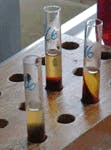Researchers in Toronto, Canada, have found that wastewater treatment facilities could produce hydrogen by fermenting dried-sludge pellets in a mixture of “primary” sludge, that includes items such as feces, rotting fruits and vegetables, paper and textiles.
According to the Toronto Star, creating hydrogen from wastewater isn’t a new idea, but it has been difficult in the past to control the amount of hydrogen that is produced.
Youssouf Kalogo, a researcher at environmental consulting firm Hydromantis Inc., teamed up with former University of Toronto professor David Bagley, who now teaches civil engineering at the University of Wyoming, and discovered that spiking primary sludge with dried sludge pellets kills off the bad microbes and preserves the good ones.
The experiment conducted by the scientists will be published in the peer-reviewed journal Bioresource Technology, which demonstrated that pellets obtained from Ashbridges Bay Wastewater Treatment in Toronto, Canada, were an inexpensive, practical, and renewable source of microbes for generating hydrogen from sludge.
The hydrogen that is produced could be used in a fuel cell to produce electricity and heat for the treatment facility, while any surplus power could be sold back into the grid.
Lou Di Gironimo, director of wastewater treatment for the city, supplied the pellets to Kalogo and Bagley, and told the Toronto Star that he plans to review their research and will decide then whether to proceed with a pilot project to test the process.
Source: Toronto Star


